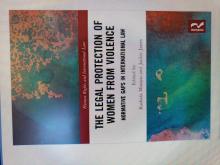
Violence against women remains one of the most pervasive human rights violations in the world today, and it permeates every society, at every level. Such violence is considered a systemic, widespread and pervasive human rights violation, experienced largely by women because they are women. Yet at the international level, there is a gap in the legal protection of women from violence. There is currently no binding international convention that explicitly prohibits such violence; or calls for its elimination; or, mandates the criminalisation of all forms of violence against women.
This book critically analyses the treatment of violence against women in the United Nations system, and in three regional human rights systems. Each chapter explores the advantages and disadvantages coming from the legal instruments, the work of the monitoring systems, and the resulting findings and jurisprudence. The book proposes that the gap needs to be addressed through a new United Nations Convention on the Elimination of All Forms of Violence against Women, or alternatively an Optional Protocol to the Convention on the Elimination of all Forms of Discrimination against Women. A new Convention or Optional Protocol would be part of the transformative agenda that is needed to normatively address the promotion of a life free of violence for women, the responsibility of states to act with due diligence in the elimination of all forms of violence against all women, and the systemic challenges that are the causes and consequences of such violence.
